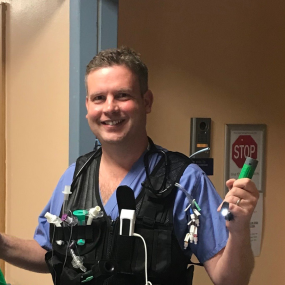Career Story: Lead Medical Examiner

After a dual-CCT in anaesthesia and intensive care medicine, I took up a consultant post in a medium-sized DGH in the midlands in 2009. My initial clinical working pattern was a mixture of around 60% time spent as an anaesthetist and 40% as an intensivist. My initial anaesthetic practice included regular urology and breast lists, emergency theatre cover and an exodontia list including children and special needs adults.
My non-clinical activity included chairing the resuscitation committee, attending the drugs and therapeutics committee, educationally supervising up to 2 trainees and being the ICM Faculty Tutor. Within a couple of years of starting as a consultant, I also took on the role of Anaesthetic College Tutor and really enjoyed the interaction with the trainees and other educational leaders across the region.
After nearly 6 years in the role of College Tutor, the opportunity to be clinical lead for critical care in my trust came up – I was fortunate at the time to have a deputy College Tutor who was well motivated and ready to take over, so I stepped down from being College Tutor and became the clinical lead for critical care instead. As we also had a willing volunteer to step into the ICM Faculty Tutor role, I stepped down from this at the same time. The lead role was more of a clinical than managerial one, so I had the opportunity to help develop the service and gain leadership experience without the downside of managing my colleagues! At around this time, having attended the ICM recruitment interviews as an interviewer several times over the years, I began to take on a more prominent role in co-ordinating and developing the national recruitment process.
The Covid pandemic came around four years into my tenure as the clinical lead. This proved to be both a demanding as well as a rewarding time, as I played my part in helping my organisation respond to the unique and huge challenge which the pandemic posed for us all.
As the pandemic receded and I was six years into my clinical lead role, I began to look for a new direction in my non-clinical career. Having been in post as one of the first cohort of Medical Examiners in my organisation for just over a year, I took the opportunity to become the Lead Medical Examiner. This came at an interesting time, with the service set to become statutory in 2023 and a lot of preparatory work that will be needed to be ready for this. To enable me to dedicate the time and energy to this, I have stepped down from the clinical lead role.
My clinical working pattern has gradually evolved over the years, such that I now spend around 40% of my clinical time as an intensivist, around 40% in the medical examiner role and 20% as an anaesthetist. To maintain my interest and commitment to ICM training, I have recently been appointed as a FFICM examiner and really enjoy the academic side of this, as well as the opportunity to meet new colleagues and renew old acquaintances. I still chair the resuscitation committee and have a trainee who I am the named clinical supervisor for, I have also taken on a governance role in the department to help guide our clinical governance programme.
As I approach what I anticipate being the last 10 years of my career, I really enjoy the balance of clinical and non-clinical work I have achieved. The clinical work keeps me grounded and enables me to still get all the satisfaction from working as a frontline clinician, whilst the non-clinical aspects of my work enable me to develop my leadership and teamworking skills as well as meet inspiring colleagues and individuals from other professional walks of life. There will still be time for me to explore new roles in the future; as always it will be a case of seeing what comes along and what I might be interested in, after all, this has always seemed to serve me well in the past.
Share your ICM story
Do you have a career story you'd like to share with us? If so we'd love to hear from you.
